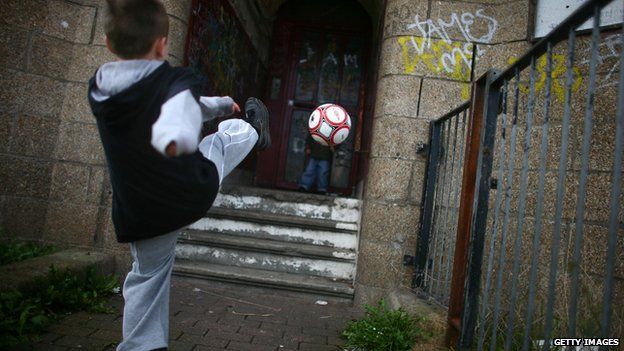Protect children from welfare cuts, UK children's commissioners say
- Published

Children and their families should be "protected from welfare cuts" - which have contributed to child poverty - the four UK children's commissioners say.
The commissioners for England, Wales, Scotland and Northern Ireland said child poverty was "unacceptably high".
In a report to the United Nations, they said government austerity measures had failed to protect the most disadvantaged and vulnerable groups.
Ministers said relative poverty was at the lowest level since the mid-1980s.
Asked about the issue during Prime Minister's Questions in the House of Commons, David Cameron said: "Our view is clear - the right answer is to create jobs, to cut taxes, to raise livings standards and to reduce welfare."
The commissioners' review of government policies since 2008 comes a week before Chancellor George Osborne delivers a Budget in which he is expected to set out further details of proposals to cut £12bn from the welfare bill.
Their report highlights the policies adopted by the coalition government in response to the global financial crisis, as well as the expected cuts under the new Conservative administration.
The government's response to the global economic downturn - including austerity and changes to the welfare system - "has resulted in a failure to protect the most disadvantaged children and those in especially vulnerable groups from child poverty", the report said.
"The best interests of children were not central to the development of these policies and children's views were not sought," it added.
"Reductions to household income for poorer children as a result of tax, transfer and social security benefit changes have led to food and fuel poverty, and the sharply increased use of crisis food bank provision by families."
In its recommendations, the report said children and their families should be protected from cuts to welfare spending.
The commissioners said poorer children were living in inadequate housing in some parts of the UK because of insufficient affordable homes.
'Significant intervention'
A child is defined as being in relative poverty when living in a household with an income below 60% of the UK's average.
Last week, government figures suggested the number of UK children classed as living in relative poverty remained 2.3 million (or 3.7 million after housing costs are taken into account).
The overall proportion affected - almost one in six - was said to have been unchanged from 2011-12 to 2013-14.
And the Department for Work and Pensions said the commissioners' report ignored the latest figures.
"The best route out of poverty is work and this government makes no apology for its efforts to raise incomes by expanding employment opportunities," a DWP spokesman said.
"Our reforms to the welfare system are focused on making work pay and our reforms to the tax system are allowing people to keep more of what they earn."
Alison Garnham, chief executive of the Child Poverty Action Group charity, described the report as a "significant intervention".
She said: "We cannot be claiming to be reducing the deficit in the name of our children if we're choosing to do that through policies that damage children's lives and prospects."
- Published1 July 2015
- Published25 June 2015
- Published24 June 2015
- Published24 June 2015
- Published25 June 2015